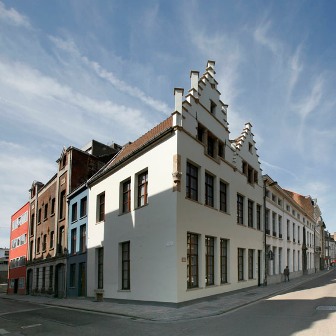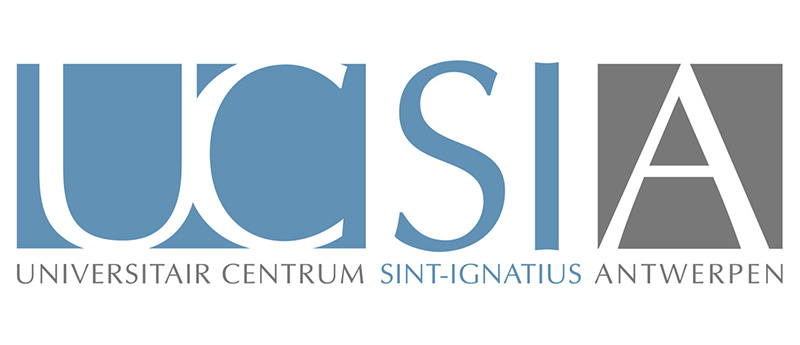Visiting Scholars
Every year, UCSIA offers the University of Antwerp the opportunity of inviting a number of foreign academics for a period of up to three months and of involving them in research activities at the institution. These academics have been residents at the University of Antwerp:
Louise Nelstrop
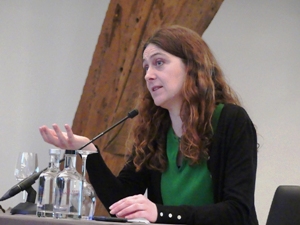
Every year, UCSIA offers the opportunity to foreign scholars who engage in prominent research, to deepen their research at the University of Antwerp.
In 2018 Louise Nelstrop was visiting scholar at the Ruusbroec Institute. Louise is Junior Research Follow at the Faculty of Theology and Religion at the University of Oxford. She lectures theology at the St. Benet’s Hall and is tutor at Galway University.
Anneke Newman
Social anthropologist Dr Anneke Newman conducted a research project on Islamic education and migration in Senegal at the Centre for Migration and Intercultural Studies (CeMiS) of the University of Antwerp under the guidance of Prof. Christiane Timmerman. This UCSIA visiting scholar is affiliated with the University of Sussex and the Laboratoire d’Anthropologie des Mondes Contemporains of the Frenchspeaking Vrije Universiteit Brussel.
On November 29, 2017 she gave a lecture in dialogue with Dr Edith Piqueray from the Department of Equal Opportunities and Diversity at the University of Antwerp. Parents choose for their children either a Koranic school, a secular public school or a hybrid French-Arabic school that offers religion alongside secular subjects. For each of these school forms, the decisions of parents are determined by the very high migration levels, especially that of adult men, insofar as this determines the money for the school trajectory and often also for the educational infrastructure. The research results challenge our stereotypes about Islamic education: we usually associate it with extremism or lack of willingness to integrate. The Islamic schools in Senegal appear not only to have an ethos of peaceful cohabitation, they constantly adapt to the educational needs and local living conditions, which depend on domestic and international migration.
Both guest speakers also flipped the commonly-held view on the role of migrants’ and refugees’ extra-curricular cultural/linguistic education. The proposed research shows that the Polish schools in Belgium support the school career and chances of success of their newcomers in general education in Flanders by surrounding them with their own cultural, social and linguistic environment and by supporting them in the school and study choices of the children. That overturns our intuition that such extracurricular cultural schools can create an effect of segregation.
Remittances by far exceed official development aid and migrants bring home technological skills and knowledge through brain circulation and, sometimes, the experience of democracy. But, bleu card immigration that only admits highly skilled professionals, often turns out to result in an inverse solidarity. Public funds invested by the poorer countries in education are lost and potential taxpayers leave the country. Tens of thousands of Indian or Philippine doctors and nurses leave for industrialised countries. In some African countries facing epidemics, up to one third of trained medical staff emigrates.
Today’s migrants to Belgium or other European countries are on average better trained than local workers. Work, income and family reunion remain important motives for migration, but new flows of migration have come into being. After going through a temporary stay for study, youngsters frequently migrate ‘for good’. Older people settle in a warmer climate for a more relaxed life at lower living costs. All over the world, marriage migration is developing.
Prof. Castles also examined a form of involuntary and non-economic migration: the world has 45 million displaced persons, an increasing number. Richer countries are quite eager to admit millions of migrants – regular or irregular – but each year accept a maximum of 80.000 refugees. Asylum seekers and refugees are at the bottom of the migration ladder.
Migration should be considered as a normal ingredient of global change and human development. It requires a judicious policy, cooperation and consultation with all those involved including the migrants themselves and suitable global institutions and agreements.
Vice-rector Prof. Dr. Johan Meeusen tied this analysis to the University of Antwerp. The city of Antwerp is host to 170 nationalities, one third of its inhabitants have a foreign origin and this share will increase to four fifths in 2030. The university and the associated schools of higher education will have to respond to this increasing diversity sooner than their counterparts elsewhere in Flanders, its active pluralism being a trump card because it stands for respect, critical reflection and dialogue.
Contributors: Prof. Dr. Stephen Castles (universities of Oxford & Sydney), Prof. Dr. Johan Meeusen (Vice-Rector University of Antwerp) and Prof. Dr. Christiane Timmerman (CeMIS, University of Antwerp).
Taede Smedes
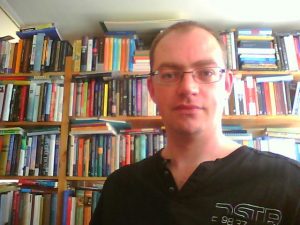 Theologian and Philosopher of Religion Dr Taede Smedes, associated with the Dominican Study Centre for Theology and Society in Amsterdam, conducted a research project Beyond Theism and Atheism: Inciting a New Hermeneutics of Contemporary Religious Landscape. His supervisor was Prof. Walter Van Herck (Department of Philosophy, University of Antwerp). On December 1, 2015 he gave a lecture and master class at the University of Antwerp on the polarization between ‘theism’ and ‘atheism’. The public controversy removes a silent revolution from view.
Theologian and Philosopher of Religion Dr Taede Smedes, associated with the Dominican Study Centre for Theology and Society in Amsterdam, conducted a research project Beyond Theism and Atheism: Inciting a New Hermeneutics of Contemporary Religious Landscape. His supervisor was Prof. Walter Van Herck (Department of Philosophy, University of Antwerp). On December 1, 2015 he gave a lecture and master class at the University of Antwerp on the polarization between ‘theism’ and ‘atheism’. The public controversy removes a silent revolution from view.
The fact that classic belief in God – ‘theism’ – is shrinking does not necessarily mean an increase in atheism, because many people are coming up with their own forms of spirituality. At the same time, more and more ‘atheists’ are wondering whether atheism can count as a meaningful alternative framework without its own constructive philosophical interpretation. Are the terms ‘belief’ and ‘disbelief’, ‘religious’ and ‘atheist’ still usable? Or do they merely indicate a reality that does not actually exist?
The visiting scholar responded in a blog to the public reactions to his text on the tension between faith and science in the Dutch context and also wrote an extensive review of the book Extinguished Candles and Raging Flames. The Secularization Thesis Reconsidered (Uitgeverij Polis, 2015, in Dutch).
Valentina Gentile
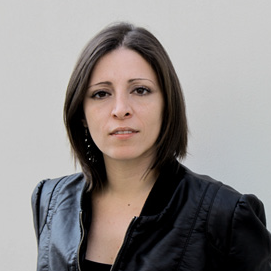 Valentina Gentile is a Research Fellow and Adjunct Professor at LUISS University in Rome and Honorary Senior Research Fellow at the School of Public Policy of the University College London. She was a Marie Curie Fellow at the University of Utrecht in 2007–2008 and received her Ph.D. in Political Theory from luiss in 2008.
Valentina Gentile is a Research Fellow and Adjunct Professor at LUISS University in Rome and Honorary Senior Research Fellow at the School of Public Policy of the University College London. She was a Marie Curie Fellow at the University of Utrecht in 2007–2008 and received her Ph.D. in Political Theory from luiss in 2008.
Her research focuses on liberal tolerance in religiously polarised societies, deliberative democracy, reasonable pluralism and moral stability in post-conflict societies, liberal multiculturalism and post-colonial critique. Her recent and forthcoming publications include ‘Civil Society in Bosnia after Dayton: The Role of Associations of Victims and Relatives of Missing Persons’ in R. Marchetti and N. Tocci (eds.), Conflict Society and Peace-Building: The Role of Human Rights (Routledge, 2011) and ‘Secularism in Plural Post-Colonial Democracies: Is Liberal Toleration Enough?’ in P. Losonczi and W. Van Herck (eds.), Politics, Religion, Secularization: India and Europe (Routledge, 2012). She has co-edited with Tom Bailey, Religion and the Limits of Liberalism, Special issue of Philosophia, 40:2 (June 2012), and a collected volume on Rawls and Religion (forthcoming 2012, Columbia University Press).
On April 19th 2012 she presented her academic work in the lecture on Moral Stability and Pluralism in Deeply Divided Democracies.
The book on justice and moral stability that she was preparing during her stay in Antwerp, was published in 2013 under the title From Identity-Conflicts to Civil Societies.
Verónica Rodríguez Blanco
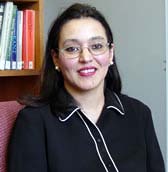 Verónica Rodríguez Blanco studied law and philosophy at Venezuela, Cambridge and Oxford and joined Birmingham Law School in 2001 where she was promoted to a Senior Lectureship in 2006. She obtained a PhD in Legal Philosophy at Corpus Christi College, University of Cambridge. She has been invited to deliver keynote lectures and papers at many universities. In 2010 she contributed to the UCSIA-workshop on ‘Normativity in Law and Society’.
Verónica Rodríguez Blanco studied law and philosophy at Venezuela, Cambridge and Oxford and joined Birmingham Law School in 2001 where she was promoted to a Senior Lectureship in 2006. She obtained a PhD in Legal Philosophy at Corpus Christi College, University of Cambridge. She has been invited to deliver keynote lectures and papers at many universities. In 2010 she contributed to the UCSIA-workshop on ‘Normativity in Law and Society’.
She has recently been awarded the Fernand Braudel Senior Research Fellowship at the European University Institute, Florence (2012). She is the Review Editor of the journal Jurisprudence: An International Journal of Legal and Political Thought, member of the Board of Editors of the ivr Encyclopedia in Jurisprudence, Legal Theory and Philosophy of Law, and member of the Forum for Law and Philosophy (University of Antwerp, Belgium). She is the author of Meta-ethics, Moral Objectivity and Law (Mentis Verlag, 2004).
Currently she is conducting research as an UCSIA scholar at the University of Antwerp. Her promotor is prof. dr. Georgios Pavlakos (Centre for Law and Cosmopolitan Values, Faculty of Law).
Public lecture – Normativity’s Web. Law under the Guise of the Good.
On November 17th 2011 professor Rodríguez Blanco gave a public lecture: The role of law in our life gives rise to fundamental questions. If we are autonomous agents, how can legislators, judges and officials directly transform our actions and indirectly change our affairs and plans of life?
Through acting, we make our intentions real and actual, and our actions can range from simple acts to the complexity of providing enabling conditions for a democratic State or the protection of Human Rights. We are a major source of change in the world and such change is sometimes mediated by human institutions, such as law. Most ordinary citizens are not, however, judges or legislators; rather they face the conflict of changing their actions and personal plans, modifying their interests, values and preferences because the law requires or demands them to do so. This situation presents us with an antagonism between the way we conceive ourselves as rational, self-governed and autonomous individuals, creators of change and planners of our own lives on the one hand, and individuals bound by an external force called law, on the other.
Dr. Rodríguez Blanco argued that the solution to the antagonism between our autonomous character and law as an external force that changes our actions, must lie in the idea that law and legal rules must show themselves in our practical reasoning. In this way, we gain control and governance over our own actions in spite of this external force called law. It is the agent who acts and follows legal rules intentionally and not blindly. In doing so the agent needs to ‘tap into’ the grounding reasons of legal rules.
The lecture scrutinised the relationships between the notions of ‘intentional action’, ‘practical reason’, ‘control guidance’ and ‘legal rule-following actions’ and tries to shed light on the normative and authoritative character of legal rules.
Beatrice Hanssen
Beatrice Hanssen is a Professor of German at the University of Georgia, Athens. During her stay at the University of Antwerp, she worked in association with Prof. Viviane Liska on the theological and ethical implications of Walter Benjamin’s theory of Eingedenken (recollection, mourning, commemoration). The research contributed to the dialogue on the theory of the Frankfurt School within the Literature Department of the University of Antwerp.
Craig Harline
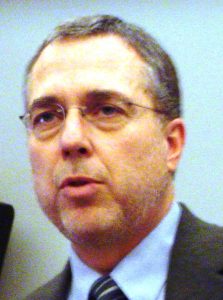 Prof. Craig Harline lectures European History at the Brigham Young University (USA). As an UCSIA scholar, he conducted research at the University of Antwerp in association with Prof. Guido Marnef (History Department). Professor Harline studied a fundamental, but hitherto much neglected aspect of the Reformation, namely the effects on families of religious conversions and mixed-religion marriages. Families who are faced with religious, cultural, racial or sexual differences are today experiencing the same essential problems: when and how do convictions and religious beliefs transcend family ties and vice versa? He presented a public lecture on this topic on 14 February 2007.
Prof. Craig Harline lectures European History at the Brigham Young University (USA). As an UCSIA scholar, he conducted research at the University of Antwerp in association with Prof. Guido Marnef (History Department). Professor Harline studied a fundamental, but hitherto much neglected aspect of the Reformation, namely the effects on families of religious conversions and mixed-religion marriages. Families who are faced with religious, cultural, racial or sexual differences are today experiencing the same essential problems: when and how do convictions and religious beliefs transcend family ties and vice versa? He presented a public lecture on this topic on 14 February 2007.
Christo Heunis
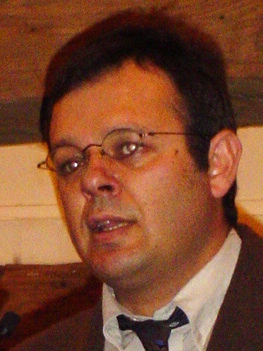 Christo Heunis is a Doctor of Sociology and a Senior Researcher with the Centre for Health Systems Research and Development (CHSR&D) of the University of the Free State, Bloemfontein. Under the supervision of Prof. Herman Meulemans, he conducted research at the University of Antwerp into ‘Determining factors in inappropriate health-seeking behaviour among TB and HIV/AIDS patients in the Free State with a view to developing appropriate intervention strategies’.
Christo Heunis is a Doctor of Sociology and a Senior Researcher with the Centre for Health Systems Research and Development (CHSR&D) of the University of the Free State, Bloemfontein. Under the supervision of Prof. Herman Meulemans, he conducted research at the University of Antwerp into ‘Determining factors in inappropriate health-seeking behaviour among TB and HIV/AIDS patients in the Free State with a view to developing appropriate intervention strategies’.
In a lecture presented on 6 December 2006, he analysed the manner in which AIDS/HIV manifests itself in the Free State and the response from government. Unlike in Europe, AIDS/HIV affects a large and predominantly heterosexual part of the Free State’s population. In conjunction with TB, it is responsible for a twin epidemic that is catastrophically destroying the social fabric of the entire society. Prof. Leen Rigouts, a Doctor of Science (Ghent University) and a postdoctoral researcher with the Institute for Tropical Medicine, described the context of the AIDS epidemic in South Africa and the rest of the African continent.
Jeffrey Müller
Jeffrey Müller, a Professor of Art History at Brown University (USA), in cooperation with Prof. Bruno Blondé (Department of History), carried out research into “Visual Communication and Counterreformation in Antwerp: 1566-1801”. On 29 June 2007, he presented an expert seminar on “The Brotherhood of the Holy Trinity to Free Christian Slaves and Its Images in Antwerp’s St-Jacob’s Church”.
Willem Van der Merwe
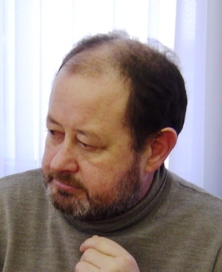 Willem Van der Merwe is a Doctor of Philosophy and a Professor with the University of Stellenbosch, RSA. In association with Prof. Guy Vanheeswijck, he carried out a research project at the University of Antwerp on ‘Post-modernity and the Christian faith; a cultural reappraisal of religion and, more specifically, of the Christian religion, in post-modern Philosophy’. He presented a public lecture on this topic on Wednesday 13 December 2006.
Willem Van der Merwe is a Doctor of Philosophy and a Professor with the University of Stellenbosch, RSA. In association with Prof. Guy Vanheeswijck, he carried out a research project at the University of Antwerp on ‘Post-modernity and the Christian faith; a cultural reappraisal of religion and, more specifically, of the Christian religion, in post-modern Philosophy’. He presented a public lecture on this topic on Wednesday 13 December 2006.
Laszlo Zsolnai
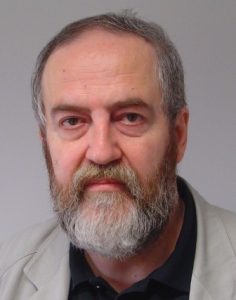 In the Spring of 2006, Laszlo ZSOLNAI, a Professor of Business Ethics with the Corvinus University of Budapest, worked at the University of Antwerp as an UCSIA scholar on a research project entitled “Spirituality, Economics and Sobriety”. Prof. Henk Opdebeeck (Centre for Ethics of the Philosophy Department) acted as his promoter and Prof. Luc Van Liedekerke as his co-promoter.
In the Spring of 2006, Laszlo ZSOLNAI, a Professor of Business Ethics with the Corvinus University of Budapest, worked at the University of Antwerp as an UCSIA scholar on a research project entitled “Spirituality, Economics and Sobriety”. Prof. Henk Opdebeeck (Centre for Ethics of the Philosophy Department) acted as his promoter and Prof. Luc Van Liedekerke as his co-promoter.
On Friday 24 March 2006, Prof. Zsolnai, in cooperation with Prof. Johan Verstraeten (KULeuven), presented a lecture on ‘Buddhists and Bishops on Globalisation’. According to Prof. Zsolnai, Buddhism strives for optimum satisfaction with the least possible consumption, a notion that ties in closely with the principles of antiglobalism. Prof. Verstraeten, who had provided input for the statement by the bishops of Belgium on the economic, cultural and social consequences of globalisation, argued that the Church should approach globalisation primarily from the perspective of those who suffer because of it.
Liliana Gomez-Popescu
Dr. Liliana Gomez-Popescu is a visiting fellow at the Institute for Latin American Studies of Columbia University (New York, USA). She will reside at the University of Antwerp – Center Pieter Gillis – in the Spring of 2009 to conduct a research project entitled “Modern Metropolis: a Cultural Analysis of The Sacral in The Urban Space”. Her promotor will be prof. dr. Walter Van Herck.
Christian Bidard
Prof. dr. Christian BIDARD teaches at the Department of Economics of Université de Paris, X – Nanterre. In the next academic year he wll conduct a research project at the University of Antwerp entiteld “On The Crossroads of Catholicism, Mathematics and Economics: Life and Work of the French Jesuit Maurice Potron (1872-1942)”. His promoter was prof. dr. Guido Erreygers.
On 29 January 2009 he gave the lecture De Rerum Novarum à la théorie économique Maurice Potron sj on the life and work of Maurice Potron.
The cooperation with the scholars of the University of Antwerp resulted in an article in “The European Journal of the History of Economic Thought”: Bidard, Christian, Erreygers, Guido and Parys, Wilfried(2009)”Our daily bread’: Maurice Potron, from Catholicism to mathematical economics’,The European Journal of the History of Economic Thought,16:1,123 — 154.
Patricia Dailey
Prof. Dr. Patricia Dailey (Columbia University) discussed the two bodies in the writings of the medieval mystic Hadewijch, upon an invitation by Prof. Dr. Veerle Fraeters.
In her 7th Vision, Hadewijch uses remarkably physical and sensual terms to express the union of her lichame with Christ in the Eucharist. But this vision is not the account of an immediate and physical experience it seems to be. Her texts are hermeneutic acts, exegetic and pedagogic tools. To interpret them one should understand the tradition and texts she was familiar with: medieval theology, scriptural commentary, devotional texts and bridal mysticism. In the 7th Vision, Hadewijch performs the theological unity she seeks to practice. Her understanding of the Eucharist culminates in an experience of union. She sees and writes what she has read: that she and her beloved are one.
According to a Hellenistic, Pauline and Augustinian tradition, she distinguishes a material body – materie – from an inner body – lichame –. In Christian tradition and mediaeval religious texts, the outer body is a temporal earthly vessel. The inner body renews itself according to the promised eternal life and persists beyond death. Returning completely to her inner body means fully dwelling in perfection – a perfection reserved for life after death but becoming visible in “visions”. Hadewijch is constantly trying to conform the outer to the inner. She must perform Christic imitatio and attend to the needs of others as part of her material existence. “Return into your material and let your works blossom forth.” Thus, Hadewijch’s “werke” are part of her way of performing her unity with her divine calling in life.
Judith Pollman
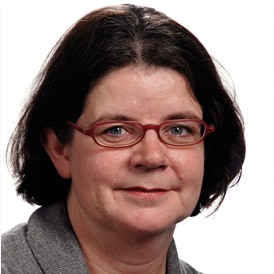 Prof. Dr. Judith Pollmann (University of Leiden) held a lecture on 11th May on “Remembrance and Religious Identity in the 17th Century Low Countries” on the initiative of Prof. Dr. Guido Marnef.
Prof. Dr. Judith Pollmann (University of Leiden) held a lecture on 11th May on “Remembrance and Religious Identity in the 17th Century Low Countries” on the initiative of Prof. Dr. Guido Marnef.
Peter Losonczi
 Prof. Dr. Peter Losonczi (Centre for Intercultural Studies, University of West Hungary) executed a research project “From an Archimedean Pluralism Towards a Negotiated Pluralism: the Relevance of Indian Views on Pluralism for a Reconceptualization of the European Context – A Study of the Work of Bilgrami”.
Prof. Dr. Peter Losonczi (Centre for Intercultural Studies, University of West Hungary) executed a research project “From an Archimedean Pluralism Towards a Negotiated Pluralism: the Relevance of Indian Views on Pluralism for a Reconceptualization of the European Context – A Study of the Work of Bilgrami”.
His promoter was Prof. Dr. Walter Van Herck and on 7 December 2010 he gave a lecture comparing Europe and India as post-secular democracies.
It is with deep regret that we learnt of the passing away of dr. Peter Losonczi. The Board of Directors and the staff of UCSIA wish to extend their sincere sympathy to the bereaved family and the scientific community. Antwerp, 19 June 2015.
Xianglong Zhang
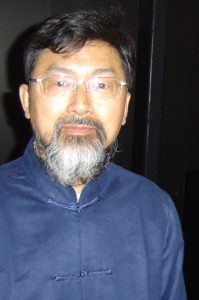 On 17th March 2011, UCSIA-scholar Xianglong ZHANG read a lecture on “The Philosophical Feauture of Confucianism”. He is a Professor at the Department of Philosophy and Religious Studies of Peking University, Beijing. At the University of Antwerp, Professor Zhang conducts a research project with Professor Rob Faesen of the Ruusbroecgenootschap on the translation of “Die geestelike brulocht”, a work written by the 14th century Flemish mystic Ruusbroec.
On 17th March 2011, UCSIA-scholar Xianglong ZHANG read a lecture on “The Philosophical Feauture of Confucianism”. He is a Professor at the Department of Philosophy and Religious Studies of Peking University, Beijing. At the University of Antwerp, Professor Zhang conducts a research project with Professor Rob Faesen of the Ruusbroecgenootschap on the translation of “Die geestelike brulocht”, a work written by the 14th century Flemish mystic Ruusbroec.
Quoting the Lun Yu or Analects, Professor Zhang stated that Confucianism doesn’t have universalistic claims. His agrarian environment influenced Confucius’ ideas, such as his conviction that love for the family precedes more universal love for the society. Or his preference for the inner spiritual way and wisdom, rather than meeting or enforcing strict laws and ethical rules: “The excellence of a noble person is the wind, while that of the petty person is the grass. As the wind blows, the grass is sure to bend.” (Analects 12.19).
Political strive in a vast and divided China, made Confucius a proponent of a decentralised political system: many independent states living in harmony because they share a common culture. Because Confucianism doesn’t seek converts or territorial gains, it could coexist with Buddhism, Taoism or Hinduism, but much more difficult with Christianity. Once adopted by the Han Dynasty as an official religion, Confucianism proved to be very enduring. It existed for two millennia until communism tried to erase it. Today, Confucianism revives in China which is possible to the extent that it enters a dialogue with other cultures and worldviews.
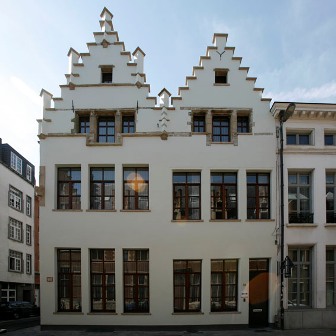
UCSIA
Koningstraat 2
B-2000 Antwerpen
info@ucsia.be
Tel. +32 (0)3 265 49 60
Voorlopige locatie tijdens de renovatiewerken:
Blindestraat 14, 2000 Antwerpen
